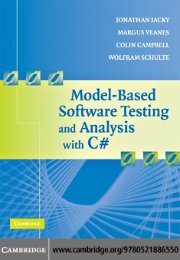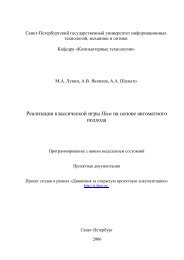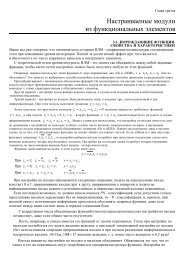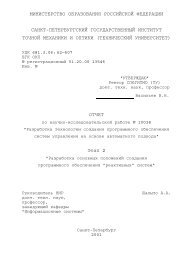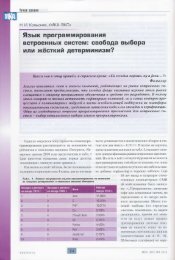- Page 2:
This page intentionally left blank
- Page 6:
more free ebooks download links at:
- Page 10:
CAMBRIDGE UNIVERSITY PRESS Cambridg
- Page 14:
vi Contents 2.7 Some simple scenari
- Page 18:
viii Contents 8.5 Limitations of of
- Page 22:
x Contents V Appendices A Modeling
- Page 26:
xii Preface specification, or appli
- Page 30:
xiv Preface one of the main purpose
- Page 34:
xvi Acknowledgments as evolving alg
- Page 38:
more free ebooks download links at:
- Page 42:
4 Describe, Analyze, Test We also t
- Page 46:
6 Describe, Analyze, Test do behave
- Page 50:
8 Describe, Analyze, Test To use ct
- Page 54:
10 Describe, Analyze, Test Concept
- Page 58:
12 Describe, Analyze, Test testing
- Page 62:
14 Why We Need Model-Based Testing
- Page 66:
16 Why We Need Model-Based Testing
- Page 70:
18 Why We Need Model-Based Testing
- Page 74:
20 Why We Need Model-Based Testing
- Page 78:
22 Why We Need Model-Based Testing
- Page 82:
24 Why We Need Model-Based Testing
- Page 86:
26 Why We Need Model-Based Testing
- Page 90:
28 Why We Need Model-Based Testing
- Page 94:
30 Why We Need Model-Based Testing
- Page 98:
32 3 Why We Need Model-Based Analys
- Page 102:
34 Why We Need Model-Based Analysis
- Page 106:
36 Why We Need Model-Based Analysis
- Page 110:
38 Why We Need Model-Based Analysis
- Page 114:
40 Why We Need Model-Based Analysis
- Page 118:
42 Why We Need Model-Based Analysis
- Page 122:
44 Why We Need Model-Based Analysis
- Page 126:
46 Why We Need Model-Based Analysis
- Page 130:
48 Why We Need Model-Based Analysis
- Page 134:
50 Why We Need Model-Based Analysis
- Page 138:
52 Why We Need Model-Based Analysis
- Page 142:
54 Further Reading The standard ref
- Page 146:
more free ebooks download links at:
- Page 150:
58 Model Programs system comprising
- Page 154:
60 Model Programs Figure 5.2. Newsr
- Page 158:
62 Model Programs reasonable work a
- Page 162:
64 Model Programs 5.3.6 Select the
- Page 166:
66 Model Programs } } static bool S
- Page 170:
68 Model Programs Parameters and lo
- Page 174:
70 Model Programs [Test] [Category(
- Page 178:
72 Model Programs that the sequence
- Page 182:
74 Model Programs ServerSend(212.0)
- Page 186:
76 Model Programs using NModel; usi
- Page 190:
78 Model Programs // ... continued
- Page 194:
80 Model Programs } } // ... contin
- Page 198:
82 Model Programs the set of argume
- Page 202:
84 Model Programs Timeout(); Poll()
- Page 206:
86 Model Programs using System; //
- Page 210:
88 Model Programs // ... Reactive s
- Page 214:
90 Model Programs // ... Reactive s
- Page 218:
92 Model Programs } } // ... Reacti
- Page 222:
94 6 Exploring and Analyzing Finite
- Page 226:
96 Exploring and Analyzing Finite M
- Page 230:
98 Exploring and Analyzing Finite M
- Page 234:
100 Exploring and Analyzing Finite
- Page 238:
102 Exploring and Analyzing Finite
- Page 242:
104 Exploring and Analyzing Finite
- Page 246:
106 Exploring and Analyzing Finite
- Page 250:
108 Exploring and Analyzing Finite
- Page 254:
110 Exploring and Analyzing Finite
- Page 258:
112 Exploring and Analyzing Finite
- Page 262:
114 Exploring and Analyzing Finite
- Page 266:
116 Structuring Model Programs with
- Page 270:
118 Structuring Model Programs with
- Page 274:
120 Structuring Model Programs with
- Page 278:
122 Structuring Model Programs with
- Page 282:
124 Structuring Model Programs with
- Page 286:
126 Structuring Model Programs with
- Page 290:
128 Structuring Model Programs with
- Page 294:
130 Structuring Model Programs with
- Page 298:
132 Structuring Model Programs with
- Page 302:
134 Structuring Model Programs with
- Page 306:
136 Structuring Model Programs with
- Page 310:
138 Testing Closed Systems Instead
- Page 314:
140 Testing Closed Systems 0 1 2 3
- Page 318:
142 Testing Closed Systems the mode
- Page 322:
144 Testing Closed Systems } } } }
- Page 326:
146 Testing Closed Systems Compile
- Page 330:
148 Testing Closed Systems B() A()
- Page 334:
150 9 Further Reading There are man
- Page 338:
more free ebooks download links at:
- Page 342:
more free ebooks download links at:
- Page 346:
156 Modeling Systems with Structure
- Page 350:
158 Modeling Systems with Structure
- Page 354:
160 Modeling Systems with Structure
- Page 358: 162 Modeling Systems with Structure
- Page 362: 164 Modeling Systems with Structure
- Page 366: 166 Modeling Systems with Structure
- Page 370: 168 Modeling Systems with Structure
- Page 374: 170 Modeling Systems with Structure
- Page 378: 172 Modeling Systems with Structure
- Page 382: 174 Modeling Systems with Structure
- Page 386: 176 Modeling Systems with Structure
- Page 390: 178 Modeling Systems with Structure
- Page 394: 180 Modeling Systems with Structure
- Page 398: 182 Modeling Systems with Structure
- Page 402: 184 Analyzing Systems with Complex
- Page 406: 186 Analyzing Systems with Complex
- Page 412: Systems with Complex State 189 11.2
- Page 416: 12 Testing Systems with Complex Sta
- Page 420: Systems with Complex State 193 This
- Page 424: Systems with Complex State 195 usin
- Page 428: Systems with Complex State 197 usin
- Page 432: Systems with Complex State 199 The
- Page 436: Systems with Complex State 201 usin
- Page 440: Systems with Complex State 203 Afte
- Page 444: Systems with Complex State 205 if (
- Page 448: Systems with Complex State 207 seve
- Page 452: Systems with Complex State 209 # fa
- Page 456: Systems with Complex State 211 the
- Page 460:
Delete("") Systems with Complex Sta
- Page 464:
Systems with Complex State 215 Test
- Page 468:
Systems with Complex State 217 "b".
- Page 472:
13 Further Reading There are many e
- Page 476:
Part IV Advanced Topics more free e
- Page 480:
14 Compositional Modeling We have s
- Page 484:
Advanced Topics 225 Only a subset o
- Page 488:
Advanced Topics 227 namespace SP {
- Page 492:
Advanced Topics 229 FSM(0, Acceptin
- Page 496:
Advanced Topics 231 namespace SP {
- Page 500:
Advanced Topics 233 namespace SP {
- Page 504:
Advanced Topics 235 ResSetup Cancel
- Page 508:
Advanced Topics 237 ReqSetup(3, _)
- Page 512:
Advanced Topics 239 namespace SP {
- Page 516:
Advanced Topics 241 14.3 Properties
- Page 520:
Advanced Topics 243 values "Inactiv
- Page 524:
Advanced Topics 245 14.4 Modeling t
- Page 528:
15 Modeling Objects In the previous
- Page 532:
Advanced Topics 249 } } public over
- Page 536:
Advanced Topics 251 This example sh
- Page 540:
Advanced Topics 253 15.3 Object IDs
- Page 544:
Advanced Topics 255 namespace Payro
- Page 548:
Advanced Topics 257 0 CreateEmploye
- Page 552:
16 Reactive Systems This chapter di
- Page 556:
Advanced Topics 261 Client Server R
- Page 560:
4 Advanced Topics 263 3 Add("b") Dr
- Page 564:
Advanced Topics 265 namespace SPImp
- Page 568:
Advanced Topics 267 condition can b
- Page 572:
Advanced Topics 269 TestResult RunT
- Page 576:
Advanced Topics 271 action. When ex
- Page 580:
A1 A2 Advanced Topics 273 a R(0) b
- Page 584:
17 Further Reading There is a lot o
- Page 588:
Advanced Topics 277 that linearizes
- Page 592:
Part V Appendices more free ebooks
- Page 596:
A Modeling Library Reference A mode
- Page 600:
Appendices 283 namespace MyModelPro
- Page 604:
Appendices 285 • If the target me
- Page 608:
Appendices 287 The example above de
- Page 612:
Appendices 289 where name is a stri
- Page 616:
Appendices 291 } { } static Set pen
- Page 620:
Appendices 293 GreaterThan(Compound
- Page 624:
Appendices 295 Forall(Predicate) Un
- Page 628:
Appendices 297 Methods The followin
- Page 632:
Appendices 299 Syntax public sealed
- Page 636:
Appendices 301 of elements. The dat
- Page 640:
Appendices 303 Add(T) Creates a bag
- Page 644:
Appendices 305 Second The second va
- Page 648:
Appendices 307 The Action data type
- Page 652:
Appendices 309 B.1.3 Options /?, /h
- Page 656:
Appendices 311 B.2 Offline test gen
- Page 660:
Appendices 313 accepting state is r
- Page 664:
C Glossary Undefined terms The foll
- Page 668:
Appendices 317 assurance method. A
- Page 672:
Appendices 319 decrementing action
- Page 676:
Appendices 321 finitize. To write a
- Page 680:
Appendices 323 IUT. Implementation
- Page 684:
Appendices 325 oracle. The authorit
- Page 688:
Appendices 327 sandbox. Atest harne
- Page 692:
Appendices 329 stopping rule. A rul
- Page 696:
Appendices 331 wait action.Anintern
- Page 700:
Bibliography J.-R. Abrial. The B Bo
- Page 704:
Bibliography 335 E. M. Clarke, O. G
- Page 708:
Bibliography 337 D. Lee and M. Yann
- Page 712:
Bibliography 339 J. Woodcock and M.
- Page 716:
Index a priori testing. See offline
- Page 720:
Index 343 Common Language Infrastru
- Page 724:
Index 345 IOCO theory, 277 isomorph
- Page 728:
Index 347 safety requirement, 34, 1
- Page 732:
Index 349 unshared action, 123-124,





